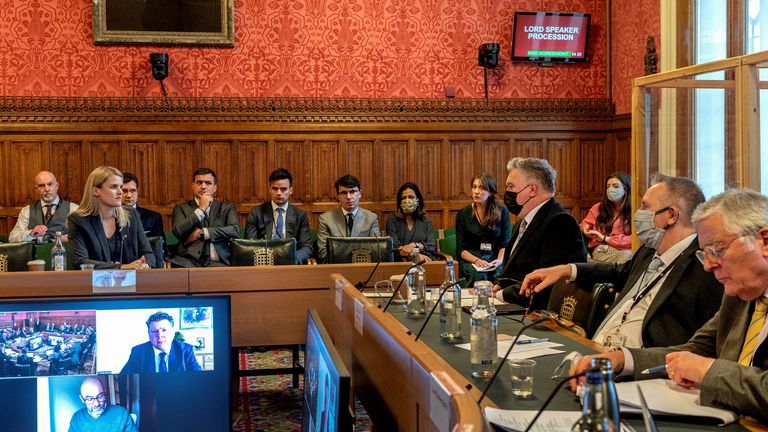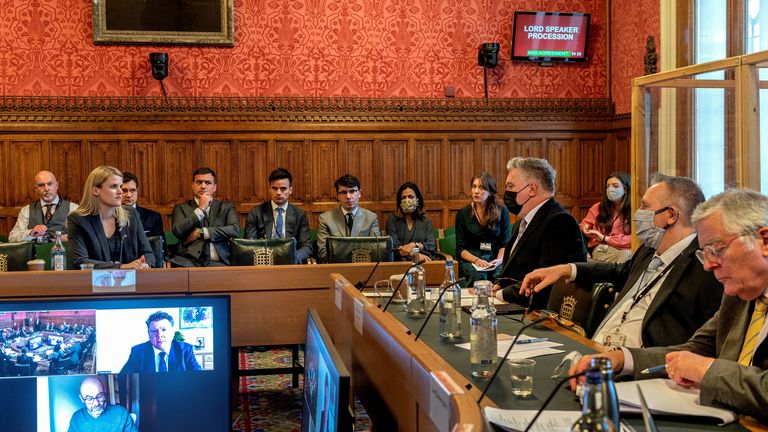
The UK should introduce several new offences to “call time on the Wild West online” , according to a report on the Online Safety Bill by a joint committee of MPs and Peers.
Alongside these new offences, the committee backed Culture Secretary Nadine Dorries’ promise of criminal sanctions for senior management figures at the tech companies within months of the bill becoming law.
The report recommended that tech companies designate a senior manager as their “Safety Controller” who would be personally liable if they fail to comply with the new law, potentially leading to prison sentences “at the end of an exhaustive legal process”.
Sir Peter Wanless, the chief executive of NSPCC, said: “Having a named manager responsible for safety, with criminal sanctions for gross failure, will focus minds on child protection at the very top of companies.”
Committee chair Damian Collins said: “The era of self-regulation for big tech has come to an end. The companies are clearly responsible for services they have designed and profit from, and need to be held to account for the decisions they make.”
Among the report’s other recommendations were to scrap a controversial power allowing the secretary of state to “modify Codes of Practice to reflect government policy” as it risked exposing Ofcom as an independent regulator to political interference.
Labour has welcomed the bill but argues that it does not go far enough to tackle fraud and that people doing shopping online won’t be protected from scams even once it does become law due to the way it references fraud.
The report a months-long inquiry in which the joint committee heard from Molly Russell’s father, as well as from former England captain Rio Ferdinand, and Facebook whistleblower Frances Haugen, about whether the proposed law would effectively protect people online.
Molly Russell was 14 when she died days before her birthday in 2017 after viewing graphic self-harm and suicide material on Instagram, something her father said “no doubt” contributed to her death.
While assisting or encouraging suicide is a criminal offence in England and Wales, the committee called for it to equally be considered illegal content online and that the technology companies should protect their users from being exposed to it.
Tackling anonymity
The report cautioned against blaming the ability for people to communicate anonymously online for the abuse suffered by footballers and women in the public life.
Speaking after England players were racially abused on social media following the Euro 2020 final, Rio Ferdinand told the committee: “Social media platforms became the toxic and racist safe place… [for people to] continually abuse our England players knowing that they are safe to be able to stay anonymous.”
The committee said that being able to post online without revealing your identity was “crucial to online safety for marginalised groups, for whistle-blowers, and for victims of domestic abuse and other forms of offline violence”.
“Anonymity and pseudo-anonymity themselves are not the problem and ending them would not be a proportionate response,” it added, however it recommended that more be done so that traceability was available for law enforcement investigating these accounts.
The report also recommends that individual users should be able to make complaints to an ombudsman when they find platforms are failing to comply with the Online Safety law.
“The Committee were unanimous in their conclusion that we need to call time on the Wild West online. What’s illegal offline should be regulated online,” said Mr Collins.
“For too long, big tech has gotten away with being the land of the lawless. A lack of regulation online has left too many people vulnerable to abuse, fraud, violence and in some cases even loss of life.
“The committee has set out recommendations to bring more offences clearly within the scope of the Online Safety Bill, give Ofcom the power in law to set minimum safety standards for the services they will regulate, and to take enforcement action against companies if they don’t comply,” he added.







More Stories
5 Reasons Why Everyone Should Look Forward to Save Earth Mission’s Takeoff Event
Save Earth Mission’s Takeoff Event Countdown Starts: Get Ready to Witness History
The Save Earth Mission: A Global Movement Towards a Sustainable Future